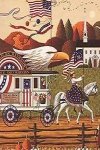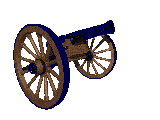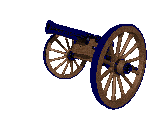


|

|
|

The origins of the words and music of "Yankee Doodle" aren't known exactly, despite research. Some trace it to a Spanish sword dance, others to Dutch peasant song or a work song from the French vineyards, or to a tune from the Basques or the Hungarians or the Irish. Perhaps the most likely origin is an English nursery rhyme, "Lucy Locket."
Regardless of its origin, it is known that the British used the tune to insult Americans before the Revolutionary War. A popular story traces the origin of the song back to the French and Indian War roughly the 1750s and a Dr. Richard Shuckburgh, a British army physician. He was so amused at the sight of the dishevelled and ragged colonial soldiers that he allegedly decided to mock them by setting some nonsense lyrics to a familiar English tune.
"Yankee" of course refers to New Englanders, the origin of "Doodle" is unknown. Which words were used originally isn't known, since none made their way into print until much later, and there were many versions.
The British had a pretty superior attitude towards the colonists, so it's not surprising that the song was popular with British troops. They used it to taunt the colonists for the next twenty years, sometimes by singing it loudly outside church services. The first attention in the press was in 1768 when the Boston Journal of the Times commented about a British band that "that 'Yankee Doodle' song was the Capital Piece of their band music." Parodies appeared as early as 1770.
Again, it is not known what the lyrics were at that time, but a sheet music version was published in London in 1775, the subtitle says "NB. The Words to be Sung thru the Nose, & in the West Country drawl & dialect". These lyrics are thought to have been derived from earlier narrative versions that might have been sung as early as the 1740s or 50s, but there is no surviving documentation.
The 1775 version starts of as:
Brother Ephraim sold his Cow
If this is an example of what the British sang during the occupation of Boston in 1768, it is not surprising to learn that the tune alone, without the words, would have been offensive to the colonists, who were proud of their brave showing in Canada.
In 1767, the melody appeared in an early American comic opera, The Disappointment, as a nonpolitical, slightly naughty ditty. During the Revolutionary War, the Americans appropriated the tune and embraced it, making it their own, turning the insult into a celebration of their defiance. A newspaper account about a month after the fighting at Lexington and Concord on April 19, 1775, reported that "Yankee Doodle" was played by the fife and drums; and added with glee, "Upon their return to Boston [pursued by the Minutemen], one [Briton] asked his brother officer how he liked the tune now,-- 'D--n them,' returned he, 'they made us dance it till we were tired.' -- Since which Yankee Doodle sounds less sweet to their ears."
A pro-British ballad was published in June 1775, just after the Battle of Bunker Hill, presumed to be to the tune of "Yankee Doodle." The first stanza goes something like this:
The seventeen of June, at Break of Day,
After the colonists' performance at Bunker Hill, these "doodle dances" became less amusing to the British. There are a number of different versions, and it's not known which came first or when. It became the principal American battle theme of the Revolution, and eventually a greater symbol of humiliation to the British than it had been to the Americans. Oscar Sonneck, the great musicologist, writing around 1909, quotes Thomas Anburey, a British officer: "The name of Yankee has been more prevalent since the commencement of hostilities. The soldiers at Boston used it as a term of reproach, but after the affair at Bunker Hill, the Americans gloried in it."
When George Washington was appointed commander in chief, he was ridiculed to the tune of Yankee Doodle by an anonymous Tory in a loyalist ballad:
Then Congress sent great Washington,
Cambridge, Massachusetts, the camp's location in the early days of the war. Edward Bangs, a sophomore at Harvard who had served at Lexington as a Minuteman, is often cited as the author of this version. The text, with variations, was often reprinted during the late 18th and early 19th centuries. Here are the first three stanzas of one early version:
Father and I went down to camp,
Yankee Doodle keep it up,
There was Captain Washington
It goes on for another seventeen verses or so.
A popular story has it that the term "macaroni" in the verse most people know best today "stuck a feather in his cap and called it macaroni" was intended to poke fun at the unsophisticated colonials. In the early 1700s, the term "macaroni" was applied derisively to English dandies who affected foreign mannerisms and fashions, particularly French or Italian, which most British regarded as outlandish. Associating the term with the American colonists was a double insult. Not only were the Yankees putting on airs, they thought the way to do it was to put feathers in their caps.
This version didn't appear in print until 1842. Sonneck wrote that in the heyday of Oliver Cromwell early 1640s to 1658, there was a ditty called "The Roundheads and the Cavaliers" that resembled "Yankee Doodle" in words and meter though not in tune:
Nankee Doodle came to town
Histories of American song list plenty of other versions and verses. Music for Patriots, Politicians, and Presidents by Vera Brodsky Lawrence, which includes photos of some of the old sheet music and broadsides. One version being:
Yankee Doodle had a mind
Yankee Doodle, fa, so la,
 Click To Let Your Friends Know About This Site
   
 Please read our Legal Statement and Privacy Policy.
|